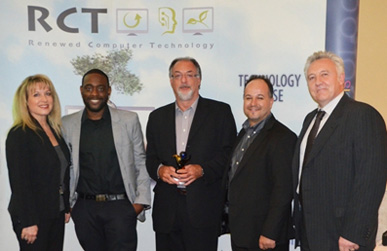

CIBC’s use of energy and the associated greenhouse gas (GHG) emissions is one of our most significant environmental aspects. We continue to pursue opportunities to reduce the direct and indirect GHG emissions associated with our operations. |
||
|
|
||||||||||
| (1) | Reported energy consumption data relates to over 95% of global occupied floor space and includes estimates where actual data is not currently available. |
| (2) | Based on the GHG Protocol Initiative. Emission factors from Environment Canada's National Inventory Report are used to estimate CO2 emissions from purchased electricity (the 1990–2008 Report for 2010; the 1990–2009 Report for 2011; and the 1990–2010 Report for 2012). |
| (3) | Employee business travel includes air, train and car travel for company business. |
| (4) | This also includes indirect emissions from the purchase of steam for heating and chilled water for cooling. |
 Rachael Wells, CIBC Internet Channels.
Rachael Wells, CIBC Internet Channels.
|
Employee business travel When travel is required, CIBC employees are asked to combine trips and meetings to make each business trip as efficient as possible. Our travel policy also encourages employees to walk, bike, carpool and use public transportation or hotel shuttles whenever possible. To improve fuel economy and reduce emissions, CIBC employees are required to rent economy size or compact vehicles. Furthermore, CIBC has standardized the installation of bike racks for all new branch locations. In our rented premises, CIBC works with our landlords to help ensure the provision of bike racks for our clients and employees. |
Greening IT
Through the use of a Technical Performance Assessment, CIBC considers many factors when purchasing information technology (IT) equipment. These include the space needed to house the equipment, service life, recyclability and energy efficiency. The following are some examples of our recent Green IT initiatives.
Server virtualization
Our IT team continues to deploy “virtual” servers that share computer resources, such as memory and disk space with other servers, which ultimately helps reduce CIBC’s energy consumption.
In 2012, over 750 virtual servers were installed, bringing the total deployed to date to more than 3,200 servers globally.
Printing management
CIBC actively promotes the use of energy-efficient, shared network, multi-functional devices, including all-in-one printer, copier and scanner devices. We also encourage our employees and departments to reuse devices rather than replace them with new ones. Since initiating this program, CIBC has retired more than 1,300 devices and reused nearly 700 devices.
Diverting electronic waste
 In order to divert electronic waste from landfill, CIBC participates in a number of programs to refurbish used electronic equipment and donate it to community programs. We are the largest corporate supporter of Renewed Computer Technology (RCT). RCT is a not-for-profit, charitable organization that is helping to meet the demand for computers in schools, public libraries and not-for-profit learning organizations. In Ontario, RCT is licensed by Industry Canada to operate the Computers for Schools (CFS) program, which collects, repairs, and refurbishes donated surplus computers from government and the private sector. The CFS program allows us to extend the life of our used electronic equipment while supporting the needs of local communities.
In order to divert electronic waste from landfill, CIBC participates in a number of programs to refurbish used electronic equipment and donate it to community programs. We are the largest corporate supporter of Renewed Computer Technology (RCT). RCT is a not-for-profit, charitable organization that is helping to meet the demand for computers in schools, public libraries and not-for-profit learning organizations. In Ontario, RCT is licensed by Industry Canada to operate the Computers for Schools (CFS) program, which collects, repairs, and refurbishes donated surplus computers from government and the private sector. The CFS program allows us to extend the life of our used electronic equipment while supporting the needs of local communities.
 CIBC receives the 2011 Gold Technology Accelerator Award from Renewed Computer Technology. |
In 2012, CIBC donated 4,143 desktops, 703 laptops and 1,360 monitors. Through this donation, we were able to divert more than 43,000 pounds of electronic waste from landfills. CIBC has supported the Computers for Schools national program since its inception in 1993. In 2012, RCT honoured CIBC with the 2011 Gold Technology Accelerator Award for the fifth year in a row. This award recognizes CIBC as the top program donor of surplus IT equipment. |
|